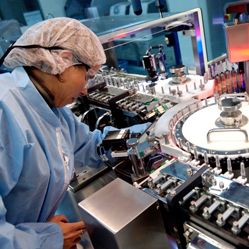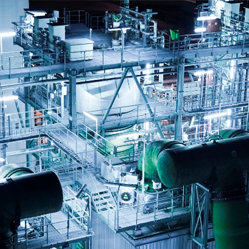INTRODUCTION

The Chemical and para-chemical industries (ICP) occupy an important place in the national economy through their product diversity and their organic link with upstream and downstream economic activities.
From 2003 to 2013 these industries have experienced steady growth, partly as a direct consequence of the government's policy for the sector, and partly through a change in consumer habits.
The sector benefits from the presence of the Office Cherifien des Phosphates (OCP), a leader in the phosphates industry, whose activities represent 52% of the sector's turnover, 90% of exports, 67% of investment and 22% of jobs.
The easy access to raw materials at low prices (phosphate) and transfer of know-how from OCP in terms of training, subcontracting, and research and development, opens additional development perspectives for new phosphate industrial activities in relation to this leading company.
Professional associations of the sector:
Main companies of the sector:
OCP, PROCTER & GAMBLE, INTERNATIONAL PAPER (IP), ATLAS PEINTURES, SOCIETE NATIONALE D’ELECTROLYSE ET DE PETROCHIMIE (SNEP), GPC, SEVAM

-
- Moroccan Plastics Federation (FCP) (telephone: 05 22 66 24 58/59; fax: 05 22 66 24 60)
- Federation of Chemicals and Para-chemicals (FCP) (www.fcpmaroc.org))
Ecosystems
A framework agreement for the development of industrial ecosystems in the phosphates sector was signed 2 April 2014 between the Ministry of Economy and Finance, the Ministry of Energy, Mining, Water and the Environment, the Ministry of Industry, Trade, Investment and Digital Economy and the Office Cherifien des Phosphates (OCP).
The purpose of this framework agreement is the development of value-creating industrial activities for phosphorus within OCP, a driving force in the sector.
The ecosystems linked to OCP are being structured. Their implementation will improve the integration of the sector, thus improving its performance and attractiveness.
On 17 December 2015 three performance contracts were concluded between the Minister in charge of Industry and the profession in order to support the deployment of 2 structured ecosystems in the areas of green chemistry and organic chemistry.
The implementation of these two ecosystems, not including OCP activities, will by 2020:
Many incentives are being introduced in order to encourage operators to meet such objectives:
-
- create 12,430 new stable direct jobs and 20,570 indirect jobs,
- generate an additional turnover of 14.6 billion dirhams,
- generate an additional added value of 3.8 billion dirhams, and
- generate an additional turnover from exports of 9.8 billion dirhams.
- support for investment, through the Industrial Development Fund (IDF), at a rate between 15% and 30% of the total amount invested,
- support for competitiveness of TPME (very small, small and medium-sized enterprises) and the self-entrepreneurs,
- support companies in the conclusion of performance contracts,
- access to property at affordable prices (39.6 hectares reserved for the organic chemistry ecosystem and 60 hectares reserved for the green chemistry ecosystem),
- attract top class international companies to accelerate the development of the ecosystems.
- setting up training to benefit the 12,430 future direct employees generated in the chemicals sector by 2020. It will be implemented at the level of the professional and engineering training establishments (OFPPT, Ecole Mohammadia d’Ingénieurs, Ecole Hassania des Travaux Publics, Ecole Nationale de l’Industrie Minérale) with special emphasis on increasing the training capacity for process engineering.
- access to bank financing through the development of an integrated offer dedicated to funding of investment and operations,
- support companies in the process of signing agreements with the Moroccan Foundation for Advanced Science, Innovation and Research (MAScIR) to facilitate access to R&D.
ASSISTANCE AND SUPPORT
Integrated and innovative support measures have been implemented to benefit the chemical industry’s companies organised into ecosystems, such as:
support for investment, through the Industrial Development Fund (IDF), at a rate between 15% and 30% of the total amount invested, support for competitiveness of TPME (very small, small and medium-sized enterprises) and the self-entrepreneurs, support companies in the conclusion of performance contracts, access to property at affordable prices (39.6 hectares reserved for the organic chemistry ecosystem and 60 hectares reserved for the green chemistry ecosystem), attract top class international companies to accelerate the development of the ecosystems. setting up training to benefit the 12,430 future direct employees generated in the chemicals sector by 2020. It will be implemented at the level of the professional and engineering training establishments (OFPPT, Ecole Mohammadia d’Ingénieurs, Ecole Hassania des Travaux Publics, Ecole Nationale de l’Industrie Minérale) with special emphasis on increasing the training capacity for process engineering. access to bank financing through the development of an integrated offer dedicated to funding of investment and operations, support companies in the process of signing agreements with the Moroccan Foundation for Advanced Science, Innovation and Research (MAScIR) to facilitate access to R&D
- Under the Investment Charter, the FPI offers partial coverage by the Government of certain expenses related to the acquisition of property (up to 20% of the cost of land), external infrastructure (up to 5% of the total amount of the investment programme, or 10% in the case of an investment in the sector of spinning, weaving or finishing) and vocational training (up to 20% of the cost of the training).
- These contributions may be combined as long as the total contribution of the state does not exceed 5% of the total investment programme; or 10% in the case of investment in the sector of spinning, weaving or finishing; or when the investment project is located in a suburban or rural area.
Eligibility criteria:
The investment project must meet at least one of the following five criteria:
- Represent an amount of 200 million dirhams or more over a 3-year period;
- To be located in one of the provinces or prefectures mentioned in Decree No. 2-98-520 dated 5 Rabii I 1419 (30 June 1998);
- Create a minimum of 250 stable jobs over 3 years;
- Provide technology transfer;
- Contribute to the protection of the environment.
As part of the Industrial Acceleration Plan, aid from the Hassan II Fund has been extended to include the chemicals and para-chemicals industries (ICP).
The Fund provides a financial contribution of up to 15% of the total amount of the investment, capped at 30 million dirhams, detailed as follows:
The investment file must include the following documents:
Tax incentives are provided for by article 123-22°-a) of the General Tax Code and Article 7.1 of finance law No. 12-98 for the 1998/9 budget year as amended and supplemented by the following:
SMEs in the sector may benefit from special support within the programmes developed by MAROC PME:
A free trade zone (ZFE) is a specified area of land devoted to export activities for industrial purposes and related service activities. Each free zone is created and delimited by a decree that determines the nature and business activities that can be established there.
The operational free trade zones are located at Tangier (Tanger Free Zone – TFZ and Tanger Automotive City – TAC), at Kenitra (Atlantic Free Zone – AFZ), at Casablanca (Midparc), at Rabat (Technopolis) and at Oujda (Technopole d’Oujda).
To obtain free zone status under law No. 19-94, companies must have obtained authorization from the local commission of the free export zone, which is presided over by the wali or governor of the region, and must make at least 70% of their turnover from exports.
Free zone status allows for the exemption of foreign trade and exchange controls, as well as access to the following state aid:
Tax incentives resulting in:
Customs benefits:
Administrative facilitations:
- 10% of the cost of commercial buildings (excluding any other state contribution given for the acquisition of land and/or construction of professional buildings);
- 20% of acquisition cost of new capital equipment (excluding any other state contribution given for the acquisition of capital equipment).
- To benefit from the funds, new investment projects (creation or expansion) must have a total investment before import duty and taxes of 10 million dirhams, with the condition that the investment in new or used capital equipment exceeds 5 million dirhams before import duty and taxes and that the investors are companies in a sector relevant to one of the following activities:
- the manufacture of cosmetic products and natural extracts;
- the recycling of local metal and plastic waste;
- the enhancement of phosphates.
- The statutes of the company;
- A detailed description of the investment project;
- The references of the investor;
- The cost of the project and the number of jobs created;
- The method of financing the project;
- The architectural plans of the buildings;
- Surveying certificate;
- A list of new equipment to purchase, with quotes;
- Installation plans with all equipment shown to scale, with the designation of all equipment (in line with the aforementioned list of equipment); The project schedule;
- A completed application form requesting assistance from the Hassan II Fund.
- The exemption from import duty on capital equipment, materials and tools necessary for the implementation of an investment project with a total cost greater than 200 million dirhams during 36 months after the signing of the investment agreement; this exemption is extended to parts, replacement parts and accessories imported at the same time as the aforementioned equipment;
- The exemption from VAT on imports of capital equipment, materials and tools necessary for the implementation of an investment project with a total cost greater than 200 million dirhams until 36 months after the start of activity by the company or from the date of issuance of the building permit, and which may be extended by six months in the event of force majeure (renewable once); this exemption is extended to parts, replacement parts and accessories imported at the same time as the aforementioned equipment.
- Exemption from income tax (IR) during the first 5 years, and then a reduction of 80% of tax on gross earned income during the following 20 years;
- Exemption from corporation tax (IS) for the first 5 years, and then a rate of 8.75% for the following 20 years;
- Exemption from professional tax for the first 15 years;
- Exemption from urban tax for the first 15 years;
- Exemption from participation in national solidarity;
- Exemption from tax on income from corporate rights, dividends and similar income for non-residents and a reduction in tax to 7.5% for residents;
- Exemption from import duties, and simplified customs procedures;
- Unlimited exemption from value added tax in respect of products delivered and services supplied to the free export zones and from the subjected territory;
- Exemption from registration fees and stamp duty on instruments of incorporation or increases in the capital of the company, as well as on land acquisitions;
- The establishment of a one-stop service to the investor.
TRAINING
The training of human resources is a strategic activity of the Industrial Acceleration Plan 2014-2020. The availability and quality of human resources determine the attractiveness of Morocco as a destination, and increase the productivity and competitiveness of the companies.
Amongst other things the strategy aims at providing the ecosystems in place with skilled profiles.
The detailed mapping of training needs - with a quantification of the human resource requirements by sector, profile, region and year - and the identification of training opportunities available in Morocco are ongoing, which will enable the development of a national training plan.
Consult the list of training needs for performance contracts signed by end - May 2017
Reception Infrastructure
In the framework of the Industrial Acceleration Plan, the Ministry plans for the mobilization of 1,000 hectares to create Integrated Industrial Rental Parks (PIL) with turnkey premises: each park will include a one stop shop for administration, a local job pool, ad hoc services and a training programme.
In parallel general and sectoral Integrated Industrial Platforms (P2I), possibly benefiting from the free zone status, guarantee the availability of property at an attractive price, comprehensive and diverse real-estate and logistics options conforming to the best international standards, as well as on-site services and a one stop shop for administration.


